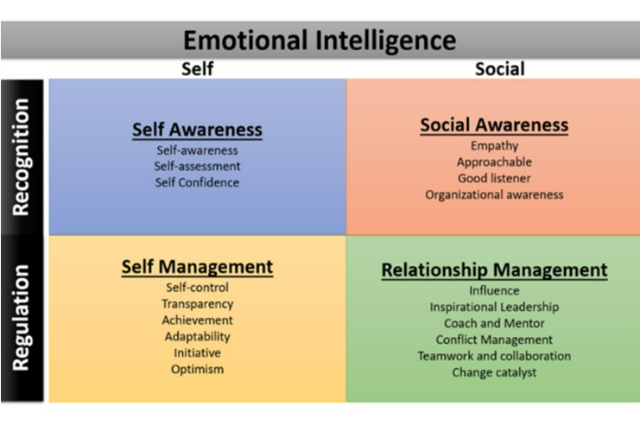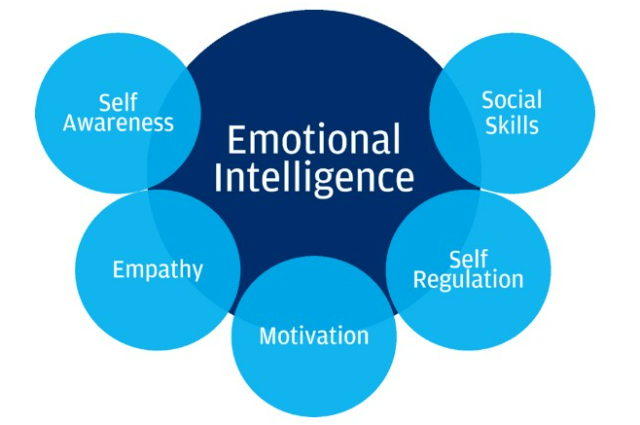
What is Emotional Intelligence?
Emotional intelligence is the way that you combine your thinking with your feelings in order to make quality decisions and built authentic relationships. It is a set of emotional & social skills. Emotional intelligence is also called as Emotional Quotient (EQ).
“Anyone can become angry, that is easy. But to be angry with the right person, to the right degree, at the right time, for the right purpose and in the right way – that is not easy” – Aristotle
Importance of Emotional Intelligence for a Successful leader:
- Successful leaders can be an organizations most powerful resource for increasing productivity, performance & profitability.
- The key to great leadership is managing the emotional environment of the organization by working with and through people, empowering rather than directing.
Advantages of Emotional intelligence
- Improve relationships
- Maintain control in different circumstances
- Lower stress levels
- Maintain Motivation
- Communicate well
- Influence others without conflict
- Enhance your reputation inside and outside of work
Emotional Intelligence – Why it can matter more than IQ?
- EI estimated to account 27 to 45% of job success
- EI is becoming more important than IQ in personal success.
“There is Intelligence in the Emotions & Intelligence can be brought to the Emotions”
Important areas in Emotional intelligence:

- Self-awareness
- Emotional Control
- Motivation
- Empathy
- Relationship
- Emotional intelligence
Different types of Emotions:
Happiness, Worry, Anger, Surprise, Satisfaction, Anxiety, Disgust, Fear, Sadness, Joy, Cheerful, Ecstasy, Nervous, Panic, etc.
Emotional intelligence at work:
- EI is not about catching or suppressing emotions. It is not about being nice but doing right.
- EI is about bringing emotions to the surface and proactively understanding their meaning and impact on the team & its performance.
“Emotions are like seasons. They are always in the background. We can use them to our advantage and create opportunity for ourselves.“
Importance of Feedback:
It helps to improve. It should help not hurt.
Constructive Criticism:
- Listen to it
- Don’t throw back
- Say Thank you
- It is now yours to do with what you like
Components of Emotional Intelligence:

5 Elements of EI:
- Motivation – Drive to work & succeed
- Self-awareness – Understanding yourself, your strength & weakness
- Self-regulation -The ability to control yourself and think before you act
- Empathy – How well you understand other people viewpoint.
- Social skills – Communicating & relating to others
Emotional Intelligence Ability:
- Perceiving Emotions
- Using Emotion
- Understanding Emotions
- Managing Emotions
7 Steps to develop EI:
Say to yourself…
- I am responsible for my own feelings.
- I am responsible for my own behaviour.
- I always have the choices about how respond to situations, events & people.
- No one can make me upset, angry, happy, etc.
- Identifying my choices empowers me to take fresh look at my behaviour.
- Recognising my range of choices is an excellent way to start changing my behaviour for the better.
- I can practise & learn now and more effective behaviours.
Practicing EI:
- Tune in your emotions
- Look at the layers of feelings
- Deliberately select a feeling & intensify it.
- Look at optimism with realism
- Ask yourself? Is this factual or relationship issue
- When you are feeling uncertain, ask yourself what will create the most value for us all?
Bonus Tip:
Identify something that would constitute a very small but slight improvement & work to make it an unconscious habit.
Emotional intelligence Do’s & Don’ts
Don’ts:
- Don’t assume that your emotions don’t impact on the way that you work
- Don’t think that EI is not relevant to your job
- Don’t think that your EI need no further Development.
Do’s:
- Observe your emotional reactions to other people
- Consider how you might test and develop your EI
- Ask yourself honestly how well you react to the concerns of others.
Conclusion:
Emotional intelligence can’t be learned. It can only be developed. By following the above steps & by practicing using above tips and components Emotional intelligence can be developed which will help everyone in their Personal & Professional Life.
